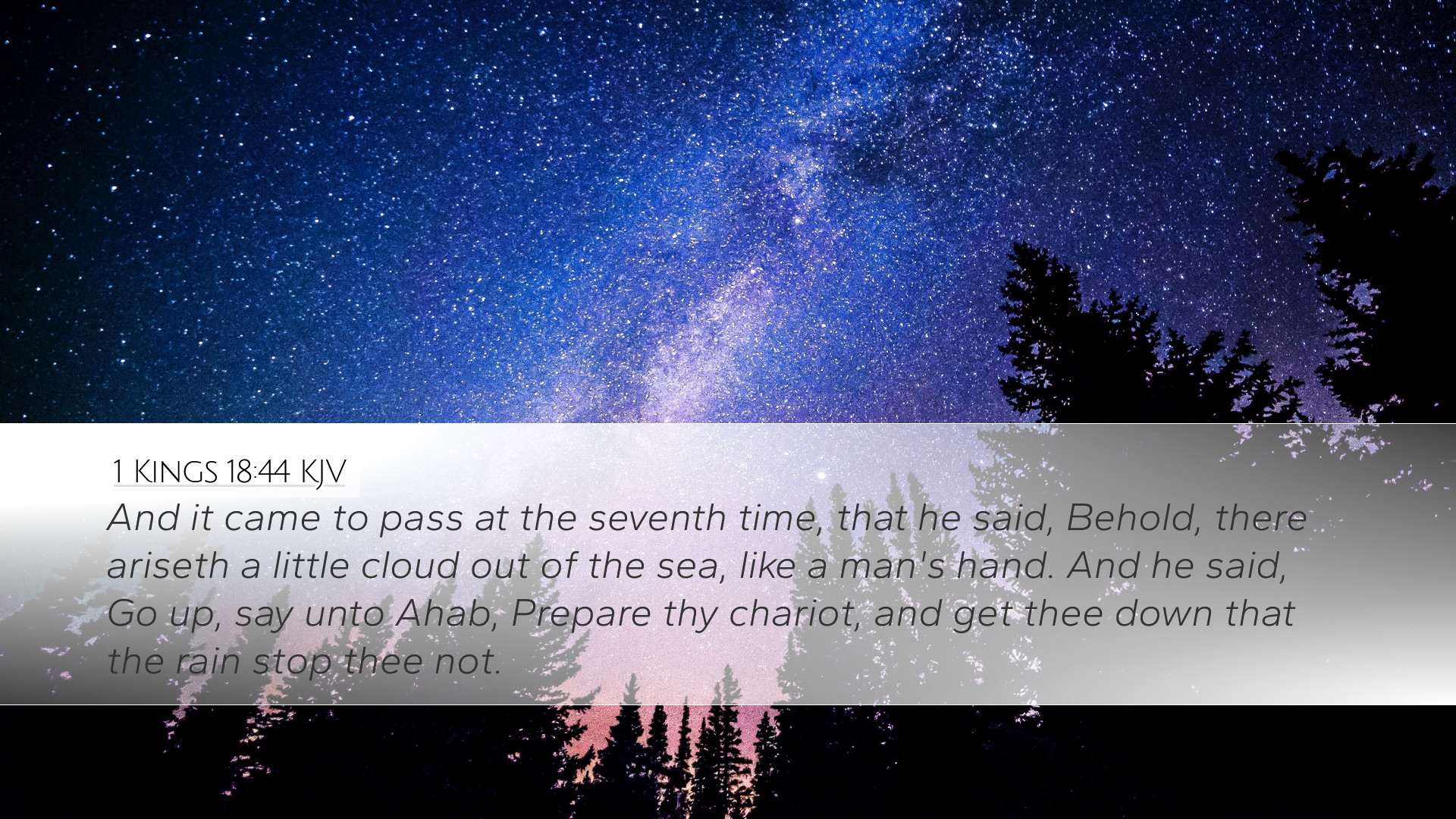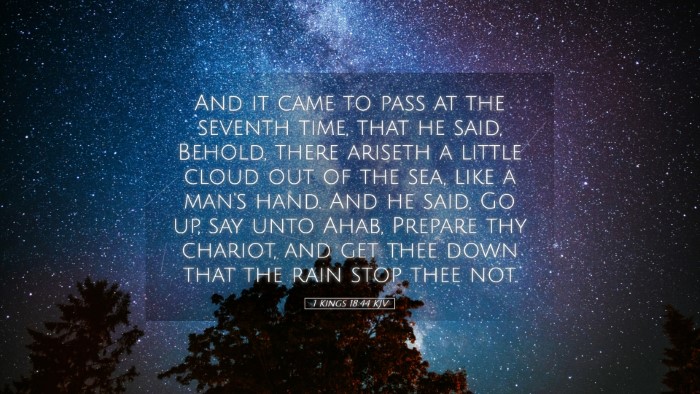Commentary on 1 Kings 18:44
Bible Verse: "And it came to pass at the seventh time, that he said, Behold, there ariseth a little cloud out of the sea, like a man's hand. And he said, Go up, say unto Ahab, Prepare thy chariot, and get thee down, that the rain stop thee not."
Overview
This verse is the climax of the contest between Elijah and the prophets of Baal, illustrating God's sovereignty and faithfulness. After a prolonged drought as a punishment for Israel's idolatry, Elijah, under divine direction, is assured of imminent rain. This small cloud signifies the beginning of God's mercy and provision for His people.
Contextual Background
The history leading up to this moment reveals the spiritual state of Israel. The reign of Ahab and the influence of his wife Jezebel had brought rampant idolatry, particularly the worship of Baal. Elijah, as the prophet of God, faced severe opposition but was steadfast in his faith. After the dramatic confrontation on Mount Carmel, where God consumed Elijah's sacrifice, the heavens were still cloudless, leading to the centurion's instruction to search for weather signs.
Commentary Insights
1. The Persistence of Prayer
Matthew Henry emphasizes the perseverance required in prayer. Elijah's servant was sent multiple times to look for signs of rain, demonstrating Elijah's unwavering faith in God's promise. This persistence is crucial to the believer's life; it reflects a heart that trusts in God's timing and provision.
2. Divine Assurances in Small Signs
Albert Barnes notes the significance of the "little cloud" that arose from the sea. This cloud was not imposing, yet it held tremendous potential for abundant rain. The imagery serves as a reminder that God often works in remarkable ways through seemingly insignificant beginnings. This principle is consistent throughout Scripture as seen in the parable of the mustard seed (Matthew 13:31-32).
3. The Role of the Servant
Adam Clarke draws attention to the servant's role in this narrative. The servant was tasked with the humble act of searching for the cloud, highlighting that God often uses ordinary people to fulfill His extraordinary plans. The faithful servant's reports, based on diligent observation, encourage the notion that God's promises come to fruition, not through chance, but through divine orchestration.
4. God's Sovereignty and Timing
Henry asserts the importance of divine timing. The rain came only after Elijah had sought the Lord through intense prayer and intercession. This underscores the truth that while God's promises are reliable, their fulfillment often requires patience and alignment with His divine schedule. Elijah's obedience in sending the servant reflects a trust in God's ability, despite observable circumstances.
Practical Applications
- Faithfulness in Prayer: Believers are encouraged to persist in prayer, trusting in God's timing.
- Recognizing God in the Small: The faithful should learn to discern God's work in modest and unexpected ways.
- The Importance of Obedience: Listening to God's commands and being obedient can lead to profound outcomes.
- Hope for the Hopeless: Like the small cloud signaling rain, signs of hope can emerge even in dire situations.
Theological Reflections
This passage serves as a reminder of God's mercy and faithfulness to His covenant people. It reflects the theme of restoration after judgment, which resonates throughout the biblical narrative. The transitory nature of drought to rain illustrates God's redemptive plan for humanity, echoing the call to repentance and return to faithfulness.
Conclusion
In summary, 1 Kings 18:44 presents a profound lesson in faith, patience, and recognition of God's work in the world. As teachers, students, and scholars reflect on this passage, they are encouraged to grasp the richness of these themes and apply them practically in their own lives and ministries. The cloud, small as it was, heralded the end of drought and the beginning of life-sustaining rain, a powerful metaphor for spiritual renewal and hope.


